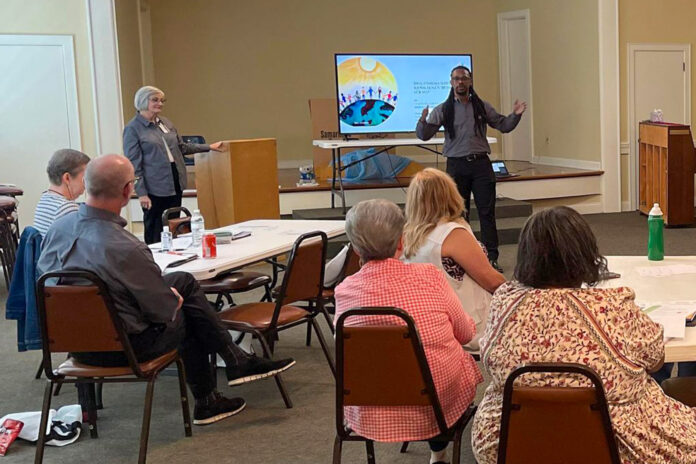
Hundreds of rural Georgians now have the skills to regulate stress and develop resiliency, thanks to the Georgia Rural Health Innovation Center at Mercer University School of Medicine.
Over five months, Joan Anderson, a senior rural health program manager, and Travis Crafter, clinical behavioral mental health specialist and licensed professional counselor, trained 1,400 people in a skills-based wellness program called the Community Resiliency Model, or CRM. Participants in the free training sessions included middle and high school students, schoolteachers and counselors, clergy, health care providers, and Mercer School of Medicine students.
The Community Resiliency Model is based on biology. It teaches individuals how to read the nervous system and regulate the body’s response to a traumatic or stressful situation.
The model uses a set of skills to maintain wellness and keep the nervous system balanced and in a resilient zone, also called the “OK Zone.” When a person is in the resilient zone, they are equipped to manage the ups and downs of life. It is a zone in which the body’s sensations are positive or neutral.
“We all have nervous systems. We all have life challenges or highly stressful events that we go through,” Crafter said. “We all need CRM at certain times in life. CRM offers a toolbox of practical skills anyone can use to regulate stress.
“So, CRM reduces the stigma. It reduces the thinking that ‘something is wrong with me.’”
Community Resiliency Model wellness skills can be used anywhere, by anyone of any age, race or socioeconomic status, and in any setting. The model is based on the principles of mirror neurons, which cause people to react to others’ actions with a “mirror” response, and modeling healthy regulated behavior.
This serves dual purposes: individuals must first engage in the Community Resiliency Model themselves to effectively share it with others.
To illustrate this further, research suggests that if, for example, teachers are in stressful environments, they in turn create stressful classrooms. Students respond to the stress that is emanating from those teachers, thereby causing more stress. Teachers can use Community Resiliency Model skills in the classroom to not only regulate themselves but also help students return to their resilient zones. Students who learn the Community Resiliency Model can help their peers or share the skills with their families.
Likewise, doctors can use Community Resiliency Model skills in the clinical setting to assist patients who may be experiencing pain or anxiety around health challenges. Faith leaders can apply them to crisis counseling situations.
“The more people who are trained and reflect these practices, the more mirroring there is. The more balanced people are, the healthier they are, and their families and communities are healthier,” Anderson said.
These six Community Resiliency Model skills are simple to use and can be shared with friends, family and peers.
- Tracking is the foundation of the model and involves reading the nervous system by paying close attention to sensations in the body that are pleasant, unpleasant or neutral.
- Resourcing is recalling a person, place or thing that brings comfort, strength, peace or happiness.
- Grounding provides a sense of steadiness through conscious awareness of physical surfaces that can be touched, such as placing one’s hands on a desk or feet on the ground.
- Gesturing is movement of the body or limbs, like raised hands, to express an emotion or attitude.
- Help Now! is completing a task that gives a break in one’s thought process or is a moment of change to reset, which could include drinking a glass of water or counting backward from 20.
- Shift and Stay is moving from one skill to another that may prove to be more beneficial in the moment or staying in one skill to regulate the nervous system.
While the Community Resiliency Model is not a replacement for professional counseling, it does address the need for community-based interventions. With the lack of access to mental health services and practitioners in rural areas, individuals can employ the model’s strategies to help mitigate or manage stress until they can be treated by a professional.
The Community Resiliency Model’s practical application is useful for anyone across a multitude of life circumstances, Crafter said.
“It doesn’t require extensive knowledge or research to employ. You can do it in a moment’s notice, and the impact of it is great,” he said.
In preparation to facilitate the Community Resiliency Model in rural communities across Georgia, Anderson and Crafter completed a 40-hour course through the Trauma Resource Institute. In March, they embarked on a mission to train community leaders, educators and laypeople in essential skills that build resiliency, so they may become Community Resiliency Model guides.
The Community Resiliency Model provides additional strategies in the wake of rising mental health symptoms and challenges in rural populations, especially in children from elementary through high school.
Anderson and Crafter trained all Washington County Schools eighth graders, a total of 225 students.
“Students today are faced with many challenges, and they can use as many skills and resources in their toolbox that we can provide them,” said Misty Ivey, the school system’s social worker. “One of our main focuses at Washington County Schools is the social and emotional well-being of our students.
“This training provided information and resources on coping skills for our students that they can apply to everyday situations.”
For more information on how your school, group or organization can receive free Community Resiliency Model training, contact Anderson at anderson_jh@georgiaruralhealth.org.








